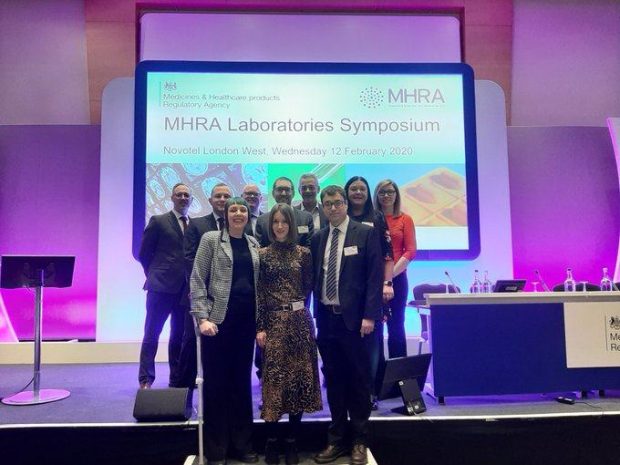Between 11 and 14 February 2020, the MHRA hosted a week-long series of events as part of the Good Practice Symposia Week. This included individual events from the GPvP, GCP and Laboratories Inspectorates where a host of regulators and delegates from across the globe came together.
Second on the week-long agenda was the laboratories symposium, running on the 12th February and attended by 315 delegates. We have received lots of helpful feedback this year and will be using it to plan our future events. We are always very grateful for the time taken to provide constructive feedback so we can better tailor our events to our stakeholders needs.

The laboratories event highlighted the importance of ‘fit for intended use’ and how this applied to several areas of laboratories work including;
Fit for Intended Use & Change
Stephen Vinter delivered the first of the day’s presentations discussing how changes in an organisation can have real potential to impact compliance. Example inspection findings were used to illustrate key considerations during periods of change across several areas including people, equipment and methods. The presentation highlighted the importance of people across all changes within an organisation.
Equipment Qualification
Following neatly on from the importance of controlling change in an organisation the laboratory teams newest recruit Christopher Smith gave a well-received presentation on the control of qualification of equipment. Christopher took us through the qualification lifecycle covering the process from initial design, installation, operation, performance and eventual retirement of equipment.
Analytical Methods
Christine Gray treated us to a baking themed analytical method presentation which aimed to clarify the difference between ‘fit for purpose’ and validation testing. The presentation was a light-hearted take on things which can impact whether a method (or a cake recipe!) is, and remains, fit for purpose. A variety of, in some cases terrifying, hedgehog cakes were used to illustrate how even the best intentions can end with some interesting and difficult to process end results.
Training
Martin Reed and Emma Whale guided us though the topic of training in the first of our two interactive sessions. Their presentation covered an assessment on the quality of training, and associated training documents. The assessment of individuals competency from a point of humble beginnings to on-going development was covered.
Quality Management Systems
Stephen Vinter returned to the stage for the second of his presentations designed to demonstrate the importance of an effective of a quality management system. Examples from inspection were used to discuss the importance of risk management, maintaining oversight of all systems within an organisation, and implementing effective actions.
Laboratory Data Flows
Jason Wakelin-Smith presented on the importance of understanding how your analytical data is managed throughout its lifecycle across production, handling and interpretation. Complete and transparent data production, as well as putting in place procedures which ensure consistent and controlled interpretation, can be crucial to maintaining compliance.
Reporting
Michael McGuinness discussed the process of reporting in regulatory studies and provided some handy ‘dos and don’ts’ about how best to transparently and compliantly present generated data and subsequent conclusions. Michael used several examples identified during inspections to illustrate his points.
Computerised Systems
In the second of our two interactive sessions Martin Reed and myself (Lynsay Hunter) walked through a mock inspection discussion between an inspector and an inspectee. This session was intended to give an insight into requests an inspector may make when assessing computerised systems and the rationale behind them, whilst highlighting some common deficiencies along the way.
Delegates also had the opportunity to network with industry colleagues, discuss queries with the inspectors during the inspector’s surgeries, as well as submit questions during the panel session. Whilst we always try to answer as many questions as possible, unfortunately we cannot answer them all. If you would like a response to an unanswered query, or indeed have any new questions or concerns you would like to discuss with an inspector, please send it to the laboratories group shared email address at GXPlabs@mhra.gov.uk.
You can follow the take home messages and highlights of the event using #MHRAlabs20
Don’t miss the next post, sign up to be notified by email when a new post comes out


2 comments
Comment by William Drummond posted on
I was unable to attend. Were these sessions recorded and are the slides available?
Comment by Sara Berry posted on
Dear William, the labs event was not recorded or live streamed. The presentation material is only available to registered delegates as this was a paid event. Kind Regards Sara